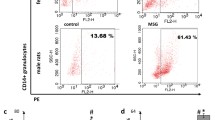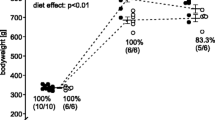Abstract
Purpose
Obesity is associated with impaired immune defences and chronic low levels of inflammation and oxidation. In addition, this condition may lead to premature aging. The aim of the study was to evaluate the effects of a nutritional supplementation with monounsaturated and n-3 polyunsaturated fatty acids on several functions and oxidative stress parameters in peritoneal immune cells of obese mice, as well as on the life span of these animals.
Methods
Obesity was induced in adult female ICR/CD1 by the administration of a high-fat diet (HFD) for 14 weeks. During the last 6 weeks of HFD feeding, one group of obese mice received the same HFD, supplemented with 1500 mg of 2-hydroxyoleic acid (2-OHOA) and another with 3000 mg of eicosapentaenoic acid (EPA) and docosahexaenoic acid (DHA). Several functions and oxidative stress parameters of peritoneal leukocytes were evaluated.
Results
The groups of obese mice treated with 2-OHOA or with EPA and DHA showed a significant improvement in several functions such as chemotaxis, phagocytosis, digestion capacity, Natural killer activity and lymphoproliferation in response to mitogens. All of these functions, which were decreased in obese mice, increased reaching similar levels to those found in non-obese controls. Both treatments also improved oxidative stress parameters such as xanthine oxidase activity, which decreased, catalase activity and glutathione levels, which increased.
Conclusion
These data suggest that dietary supplementation with monounsaturated and n-3 polyunsaturated fatty acids could be an effective nutritional intervention to restore the immune response and oxidative stress state, which are impaired in obese mice.





Similar content being viewed by others
References
Albuquerque KF, Marinovic MP, Morandi AC, Bolin AP, Otton R (2016) Green tea polyphenol extract in vivo attenuates inflammatory features of neutrophils from obese rats. Eur J Nutr 55:1261–1274
Miyoshi M, Ogawa A, Higurashi S, Kadooka Y (2014) Anti-obesity effect of Lactobacillus gasseri SBT2055 accompanied by inhibition of pro-inflammatory gene expression in the visceral adipose tissue in diet-induced obese mice. Eur J Nutr 53:599–606
Lamas O, Martínez JA, Marti A (2004) Energy restriction restores the impaired immune response in overweight (cafeteria) rats. J Nutr Biochem 15:418–425
Swindell WR, Johnston A, Gudjonsson JE (2010) Transcriptional profiles of leukocyte populations provide a tool for interpreting gene expression patterns associated with high fat diet in mice. PLoS One 5:e11861
Sheridan PA, Paich HA, Handy J et al (2012) Obesity is associated with impaired immune response to influenza vaccination in humans. Int J Obes (Lond) 36:1072–1077
Huttunen R, Syrjänem J (2013) Obesity and the risk and outcome of infection. Int J Obes (Lond) 37:333–340
Hunsche C, Hernandez O, De la Fuente M (2016) Impaired immune response in old mice suffering from obesity and premature immunosenescence in adulthood. J Gerontol A Biol Sci Med Sci 71:983–991
Dandona P, Aljada A, Bandyopadhyay A (2004) Inflammation: the link between insulin resistance, obesity and diabetes. Trends Immunol 25:4–7
Rath E, Haller D (2011) Inflammation and cellular stress: a mechanistic link between immune-mediated and metabolically driven pathologies. Eur J Nutr 50:219–233
Schenk S, Saberi M, Olefsky JM (2008) Insulin sensitivity: modulation by nutrients and inflammation. J Clin Invest 118:2992–3002
Giordano A, Murano I, Mondini E et al (2013) Obese adipocytes show ultrastructural features of stressed cells and die of pyroptosis. J Lipid Res 54:2423–2436
Vida C, González EM, De la Fuente M (2014) Increase of oxidation and inflammation in nervous and immune systems with aging and anxiety. Curr Pharm Des 20:4656–4678
Versini M, Jeandel PY, Rosenthal E, Shoenfeld Y (2014) Obesity in autoimmune diseases: not a passive bystander. Autoimmun Rev 13:981–1000
De la Fuente M, Miquel J (2009) An update of the oxidation-inflammation theory of aging: the involvement of the immune system in the oxi-inflamm-aging. Curr Pharm Des 15:3003–3026
De la Fuente M, De Castro NM (2012) Obesity as a model of premature immunosenescence. Curr Immunol Rev 8:63–75
Alvarado C, Alvarez P, Jiménez L, De la Fuente M (2006) Oxidative stress in leukocytes from young prematurely aging mice is reversed by supplementation with biscuits rich in antioxidants. Dev Comp Immunol 30:1168–1180
De la Fuente M, Cruces J, Hernandez O, Ortega E (2011) Strategies to improve the functions and redox state of the immune system in aged subjects. Curr Pharm Des 17:3966–3993
Ruzickova J, Rossmeisl M, Prazak T et al (2004) Omega-3 PUFA of marine origin limit diet-induced obesity in mice by reducing cellularity of adipose tissue. Lipids 39:1177–1185
Pérez-Martínez P, García-Ríos A, Delgado-Lista J, Pérez-Jiménez F, López-Miranda J (2011) Mediterranean diet rich in olive oil and obesity, metabolic syndrome and diabetes mellitus. Curr Pharm Des 17:769–777
Li Y, Ferrante A, Poulos A, Harvey DP (1996) Neutrophil oxygen radical generation. Synergistic responses to tumor necrosis factor and mono/polyunsaturated fatty acids. J Clin Invest 97:1605–1609
Kumaratilake LM, Ferrante A, Robinson BS, Jaeger T, Poulos A (1997) Enhancement of neutrophil-mediated killing of Plasmodium falciparum asexual blood forms by fatty acids: importance of fatty acid structure. Infect Immun 65:4152–4157
Padovese R, Curi R (2009) Modulation of rat neutrophil function in vitro by cis- and trans-MUFA. Br J Nutr 101:1351–1359
Pisani LF, Lecchi C, Invernizzi G, Sartorelli P, Savoini G, Ceciliani F (2009) In vitro modulatory effect of omega-3 polyunsaturated fatty acid (EPA and DHA) on phagocytosis and ROS production of goat neutrophils. Vet Immunol Immunopathol 131:79–85
Paschoal VA, Vinolo MA, Crisma AR, Magdalon J, Curi R (2013) Eicosapentaenoic (EPA) and docosahexaenoic (DHA) acid differently modulate rat neutrophil function in vitro. Lipids 48:93–103
Gorjão R, Verlengia R, Lima TM et al (2006) Effect of docosahexaenoic acid-rich fish oil supplementation on human leukocyte function. Clin Nutr 25:923–938
Rodrigues HG, Vinolo MA, Magdalon J et al (2010) Dietary free oleic and linoleic acid enhances neutrophil function and modulates the inflammatory response in rats. Lipids 45:809–819
De Pablo MA, Ortega E, Gallego AM, Alvarez C, Pancorbo PL, Alvarez de Cienfuegos G (1998) The effect of dietary fatty acid manipulation on phagocytic activity and cytokine production by peritoneal cells from Balb/c mice. J Nutr Sci Vitaminol (Tokyo) 44:57–67.
Robinson LE, Field CJ (1998) Dietary long-chain (n-3) fatty acids facilitate immune cell activation in sedentary, but not exercise-trained rats. J Nutr 128:498–504
Yaqoob P, Knapper JA, Webb DH, Williams CM, Newsholme EA, Calder PC (1998) Effect of olive oil on immune function in middle-aged men. Am J Clin Nutr 67:129–135
Blok WL, Vogels MT, Curfs JH, Eling WM, Buurman WA, van der Meer JW (1992) Dietary fish-oil supplementation in experimental gram-negative infection and in cerebral malaria in mice. J Infect Dis 165:898–903
Teague H, Fhaner CJ, Harris M, Duriancik DM, Reid GE, Shaikh SR (2013) n-3 PUFAs enhance the frequency of murine B-cell subsets and restore the impairment of antibody production to a T-independent antigen in obesity. J Lipid Res 54:3130–3138
De Pablo MA, Ortega E, Gallego AM, Alvarez C, Pancorbo PL, Alvarez de Cienfuegos G (1998) Influence of diets containing olive oil, sunflower oil or hydrogenated coconut oil on the immune response of mice. J Clin Biochem Nutr 25:11–23
Yaqoob P, Newsholme EA, Calder PC (1994) The effect of dietary lipid manipulation on rat lymphocyte subsets and proliferation. Immunology 82:603–610
Otton R, Marin DP, Bolin AP et al (2012) Combined fish oil and astaxanthin supplementation modulates rat lymphocyte function. Eur J Nutr 51:707–718
De Pablo MA, Alvarez de Cienfuegos G (2000) Modulatory effects of dietary lipids on immune system functions. Immunol Cell Biol 78:31–39
Vögler O, López-Bellan A, Alemany R et al (2008) Structure-effect relation of C18 long-chain fatty acids in the reduction of body weight in rats. Int J Obes (Lond) 32:464–473
Mujico JR, Baccan GC, Gheorghe A, Díaz LE, Marcos A (2013) Changes in gut microbiota due to supplemented fatty acids in diet-induced obese mice. Br J Nutr 110:711–720
Martínez J, Vögler O, Casas J et al (2005) Membrane structure modulation, protein kinase C alpha activation, and anticancer activity of minerval. Mol Pharmacol 67:531–540
Alemany R, Terés S, Baamonde C, Benet M, Vögler O, Escribá PV (2004) 2-hydroxyoleic acid: a new hypotensive molecule. Hypertension 43:249–254
Guayerbas N, Catalán M, Víctor VM, Miquel J, De la Fuente M (2002) Relation of behaviour and macrophage function to life span in a murine model of premature immunosenescence. Behav Brain Res 134:41–48
Guayerbas N, Puerto M, Víctor VM, Miquel J, De la Fuente M (2002) Leukocyte function and life span in a murine model of premature immunosenescence. Exp Gerontol 37:249–256
Alonso-Fernández P, De la Fuente M (2011) Role of the immune system in aging and longevity. Curr Aging Sci 4:78–100
De la Fuente M, Hernanz A, Guayerbas N, Alvarez P, Alvarado C (2004) Changes with age in peritoneal macrophage functions. Implication of leukocytes in the oxidative stress of senescence. Cell Mol Biol (Noisy-le-grand) 50:683–690
Vida C, Rodríguez-Terés S, Heras V, Corpas I, De la Fuente M, González E (2011) The aged-related in xanthine oxidase expression and activity in several tissues from mice is not shown in long-lived animals. Biogerontology 12:551–564
Baccan GC, Díaz LE, Hernández O et al (2013) Obesity during adolescence in ICR-CD1 mice causes CVD risk in the adulthood (abstract). Proc Nutr Soc 72:E13
Du S, Jin J, Fang W, Su Q (2015) Does fish oil have an anti-obesity effect in overweight/obese adults? A meta-analysis of randomized controlled trials. PLoS One 10:e0142652
Gorjão R, Cury-Boaventura MF, de Lima TM, Curi R (2007) Regulation of human lymphocyte proliferation by fatty acids. Cell Biochem Funct 25:305–315
Grattagliano I, Palmieri VO, Portincasa P, Moschetta A, Palasciano G (2008) Oxidative stress-induced risk factors associated with the metabolic syndrome: a unifying hypothesis. J Nutr Biochem 19:491–504
El-Kholy TA, Abu Hilal M, Al-Abbadi HA et al (2014) The effect of extra virgin olive oil and soybean on DNA, cytogenicity and some antioxidant enzymes in rats. Nutrients 6:2376–2386
Musumeci G, Maria Trovato F, Imbesi R, Castrogiovanni P (2014) Effects of dietary extra-virgin olive oil on oxidative stress resulting from exhaustive exercise in rat skeletal muscle: a morphological study. Acta Histochem 116:61–69
Abdou HM, Hassan MA (2014) Protective role of omega-3 polyunsaturated fatty acid against lead acetate-induced toxicity in liver and kidney of female rats. Biomed Res Int 2014:435857
Patten AR, Brocardo PS, Christie BR (2013) Omega-3 supplementation can restore glutathione levels and prevent oxidative damage caused by prenatal ethanol exposure. J Nutr Biochem 24:760–769
Acknowledgements
This work was supported by grants from Ministry of Science and Innovation (BFU2011-30336), the Research Group of Madrid Complutense University (910379ENEROINN), Red Temática de Investigación Cooperativa en Envejecimiento y Fragilidad (RETICEF RD12/0043/0018) and FIS (PI15/01787) of Institute de Salud Carlos III—Fondo Europeo de Desarrollo Regional (ISCIII-FEDER), the PRONAOS study and BTSA-Applied Biotechnologies S.L. Caroline Hunsche is the recipient of a PhD fellowship from CNP-q-Brazil.
Author information
Authors and Affiliations
Corresponding author
Ethics declarations
Conflict of interest
The authors declare no conflict of interest.
Rights and permissions
About this article
Cite this article
Hunsche, C., Hernandez, O., Gheorghe, A. et al. Immune dysfunction and increased oxidative stress state in diet-induced obese mice are reverted by nutritional supplementation with monounsaturated and n-3 polyunsaturated fatty acids. Eur J Nutr 57, 1123–1135 (2018). https://doi.org/10.1007/s00394-017-1395-1
Received:
Accepted:
Published:
Issue Date:
DOI: https://doi.org/10.1007/s00394-017-1395-1




